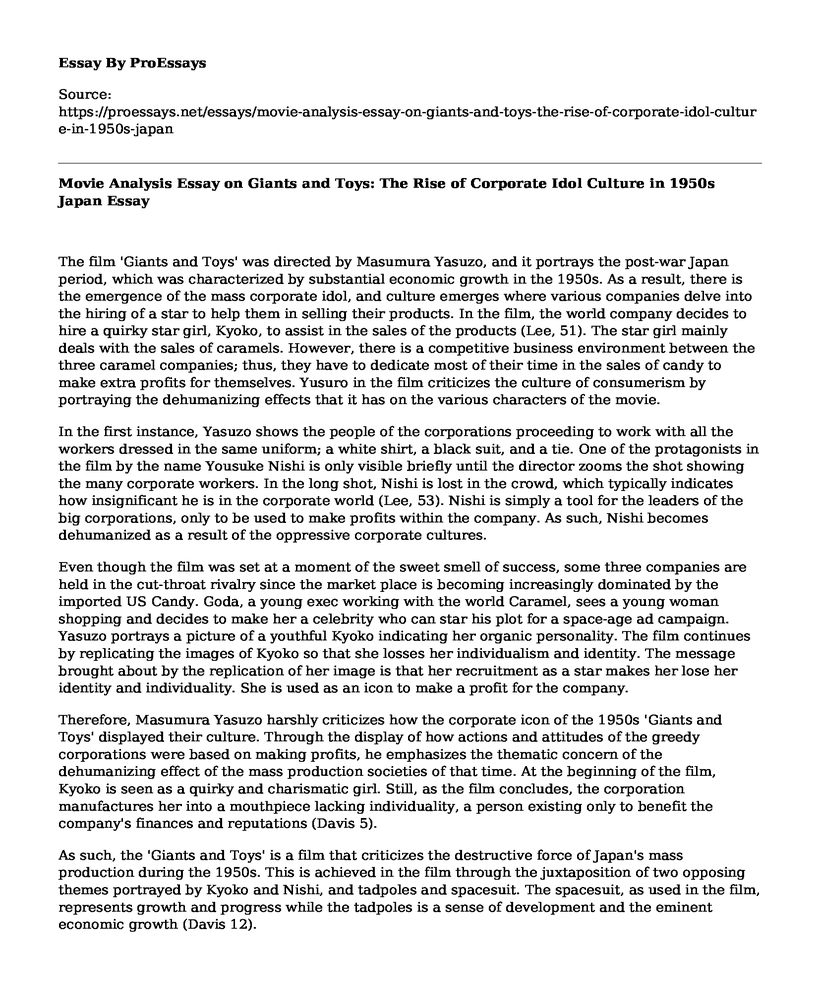The film 'Giants and Toys' was directed by Masumura Yasuzo, and it portrays the post-war Japan period, which was characterized by substantial economic growth in the 1950s. As a result, there is the emergence of the mass corporate idol, and culture emerges where various companies delve into the hiring of a star to help them in selling their products. In the film, the world company decides to hire a quirky star girl, Kyoko, to assist in the sales of the products (Lee, 51). The star girl mainly deals with the sales of caramels. However, there is a competitive business environment between the three caramel companies; thus, they have to dedicate most of their time in the sales of candy to make extra profits for themselves. Yusuro in the film criticizes the culture of consumerism by portraying the dehumanizing effects that it has on the various characters of the movie.
In the first instance, Yasuzo shows the people of the corporations proceeding to work with all the workers dressed in the same uniform; a white shirt, a black suit, and a tie. One of the protagonists in the film by the name Yousuke Nishi is only visible briefly until the director zooms the shot showing the many corporate workers. In the long shot, Nishi is lost in the crowd, which typically indicates how insignificant he is in the corporate world (Lee, 53). Nishi is simply a tool for the leaders of the big corporations, only to be used to make profits within the company. As such, Nishi becomes dehumanized as a result of the oppressive corporate cultures.
Even though the film was set at a moment of the sweet smell of success, some three companies are held in the cut-throat rivalry since the market place is becoming increasingly dominated by the imported US Candy. Goda, a young exec working with the world Caramel, sees a young woman shopping and decides to make her a celebrity who can star his plot for a space-age ad campaign. Yasuzo portrays a picture of a youthful Kyoko indicating her organic personality. The film continues by replicating the images of Kyoko so that she losses her individualism and identity. The message brought about by the replication of her image is that her recruitment as a star makes her lose her identity and individuality. She is used as an icon to make a profit for the company.
Therefore, Masumura Yasuzo harshly criticizes how the corporate icon of the 1950s 'Giants and Toys' displayed their culture. Through the display of how actions and attitudes of the greedy corporations were based on making profits, he emphasizes the thematic concern of the dehumanizing effect of the mass production societies of that time. At the beginning of the film, Kyoko is seen as a quirky and charismatic girl. Still, as the film concludes, the corporation manufactures her into a mouthpiece lacking individuality, a person existing only to benefit the company's finances and reputations (Davis 5).
As such, the 'Giants and Toys' is a film that criticizes the destructive force of Japan's mass production during the 1950s. This is achieved in the film through the juxtaposition of two opposing themes portrayed by Kyoko and Nishi, and tadpoles and spacesuit. The spacesuit, as used in the film, represents growth and progress while the tadpoles is a sense of development and the eminent economic growth (Davis 12).
Works Cited
Davis, Richard M. Wit, and wordplay: The Japanese wartime musical film, 1931-1945. The University of Chicago, 2016.
Lee, Laura. "Still Dynamic: Image and Seriality at the Dawn of Television." Japanese Cinema Between Frames. Palgrave Macmillan, Cham, 2017. 51-82.
Cite this page
Movie Analysis Essay on Giants and Toys: The Rise of Corporate Idol Culture in 1950s Japan. (2023, Mar 30). Retrieved from https://proessays.net/essays/movie-analysis-essay-on-giants-and-toys-the-rise-of-corporate-idol-culture-in-1950s-japan
If you are the original author of this essay and no longer wish to have it published on the ProEssays website, please click below to request its removal:
- The Movie "Dead Man Walking"
- Compare and Contrast Essay Example: Forms of Slavery Today and in the Movie Slavery by Another Name
- Influence of The TR-909 On House And Techno Music - Essay Sample
- The New Deal Program Long-Term Changes in United States Landscape Essay
- Gender Issues in "A Raisin in the Sun" Essay Example
- Essay Example on US Firm's Tanzania Business: Cultural Challenges for H.G.
- Essay Example on British Red-Cross: Helping People in Emergencies Worldwide







